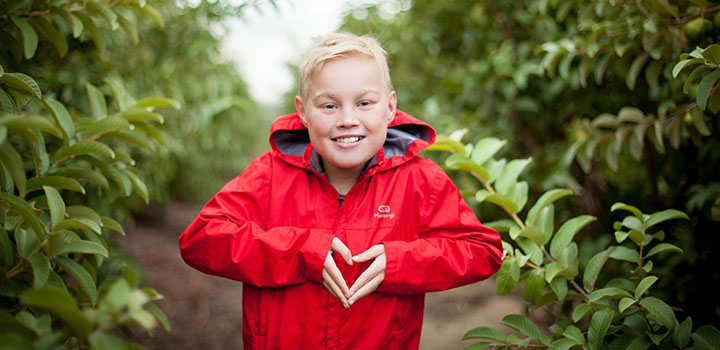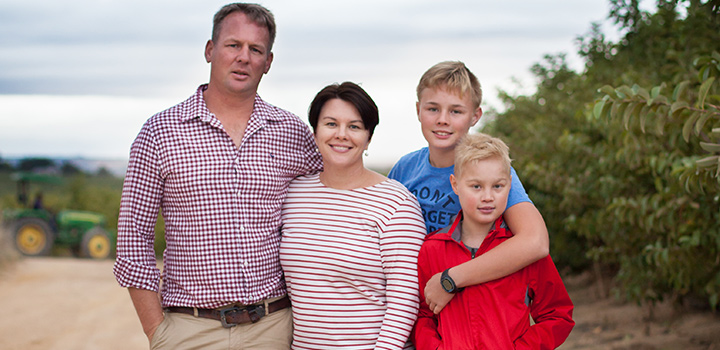Opening hearts everywhere - Chris Truter's story

The Truters make some of Wellington's finest export wines. But their main claim to fame is winning an extended battle to save their son's life. Chris was diagnosed in-utero with Hypoplastic Left heart Syndrome, one of the most challenging of all heart defects.
Celeste and Hugo Truter faced the choice to abort an infant who had a half-functioning heart - also risking potential damage to the remaining twin. With faith and conviction, they chose against abortion and the risk to the healthy infant.
Both boys were born on 30th May, 2006, at the Panorama Mediclinic in Cape Town, Basson weighing 2.05kg and Chris 1.95kg. Chris was immediately put on medication and admitted to the neonatal ICU for several weeks, his parents commuting daily from Wellington after settling Basson in at home.
One month later they had a second, perhaps even tougher choice; palliative care and a very short life for Chris, or open-heart corrective surgery with a 40% chance of success. Success was defined by top heart surgeon Dr Susan Vosloo and her colleague - an expert in the required procedure - Dr Andre Brooks, who operated with her, over a series of corrective heart surgeries.
Surviving against all odds
Says Celeste; “It was probably the most stressful time in our lives, sitting around in hospital not knowing whether Chris would be the first child to ever survive this procedure in the Western Cape.”
But, Chris beat the odds – and then again in two subsequent high-risk surgeries required to keep his heart pumping sufficiently to stay alive. From then on, he slowly began to thrive. When he and Basson were 11 years old, the Truters took a long-awaited holiday to Botswana (June 2017). However, Chris slowly began deteriorating, becoming listless and sleepy, his complexion a pallid blue.
“We were camping and he’d sleep the whole day and wasn’t eating. I freaked out internally but tried not to show it,” Celeste recalls. When they finally managed to get cell phone signal they discovered that all cardiac specialists, be they in Windhoek or Cape Town, were attending a heart congress in Europe. A stand-in cardiologist in Cape Town told them the higher altitude had probably induced heart failure by exerting pressure on Chris’s lungs and advised them to return home immediately. “It wasn’t like an ER moment, but we needed to get back as soon as we could, so we drove from Caprivi to Windhoek and then down the West coast, home. We went straight to the Red Cross War Memorial Children’s Hospital and they were amazing. We’re so pleased we live in South Africa where anyone can get top class treatment,” Celeste observes.
After two weeks Chris was transferred to the nearby Netcare Christiaan Barnard Memorial Hospital. “They wanted to put a stent in his aortic artery and wheeled him into theatre there, but he proved too weak and they decided not go ahead with the procedure,” says Celeste.
On August 1st, 2017, Chris was officially put on the heart transplant list and sent home to wait out a final roll of the dice. In December he developed a secondary condition called plastic bronchitis where fluid collects in the lungs, solidifying into a plastic-like substance which makes breathing difficult and lying down, life-threatening.
“Luckily it descends, so you can breathe and cough it up when sitting - but lying down results in it filling every space and you can’t breathe,” Celeste explains. “From December 16th we hardly slept and Chris tried to sleep sitting upright,” she adds. He failed to recover, becoming progressively weaker. The Truters went public in sourcing a donor heart for Chris, setting up a website and registering Heart4Chris, (HFC), as a trademark, working closely with the Organ Donor Foundation to promote organ donor awareness. Within a month and through a media and website campaign, they reached 20 000 people while the Organ Donor Foundation reported their efforts to have boosted organ donation by 1980 new donors. The Truters launched their H4C or Heart4Chris campaign on February 14th, 2018. Four days later they got a call from Dr Vosloo - a donor heart was available.
Donor heart call unforgettable
“We were having Sunday lunch at a restaurant on one of the Wellington farms when we got the call. It was a truly amazing moment. I cried. Chris laughed out loud in pure joy; the first time he’d done that in a very long time. We later discovered a 17-year-old girl had died in a car crash that Saturday evening and was the donor,” she says.
Chris heart transplant was a success. The donor parents became firm friends of the Truters, courtesy of traditional and social media which had carried the Truters donor campaign. It didn’t take much to connect the reportage of the tragic crash and the transplant after her family revealed their daughter to have been an organ donor.
“It was quite a turbulent time. The day after the op was fairly emotional for us because the price the donor family had paid hit home. We have contact with her mum on a virtual daily basis. It’s given them joy and peace, especially knowing that something of their daughter is still alive. That helps soothe their pain.”
Chris now often rides in the Wellington mountains on a tandem bike with his dad and wrestles or plays rugby with his very protective twin brother, all things he seldom did before. “It’s like he has a V8 engine when he had a V2 before,” Celeste enthuses. The family received stellar support during their ordeal.
“When I posted that we were coming home after the transplant, they lined the streets of Wellington – the school came out and clapped us past. We felt like Springboks winning the World Cup,” says Celeste. During their roughest times, neighbouring farmers insisted they fill up with diesel on their accounts, anonymous people provided them with prepared meals for a month and a local agricultural supplier staffer organised a prayer day for them involving 120 people. “They even packed Basson’s school lunch box for a month,” Celeste recalls.
Truters become staunch organ donor advocates

Donning her organ donor advocacy campaign, Celeste says their H4C campaign talks to youth groups whenever possible. “Our message is one of hope; that that if they could ever leave something behind to help their parents overcome the heartache of losing them, organ donation is brilliant.”
She’s assembled a volunteer team that includes a graphic designer, science teacher and printer and is about the get H4C registered as an NGO. “There’s so much that can be done. I want to get leaflets into surgical wards, for example – we won’t fix the organ donor shortage in our lifetimes, but we can make a difference,” she adds.
She’s deeply grateful for Discovery Health Medical Scheme’s (DHMS) support. “Without DHMS we’d have had to sell our house. The people we’ve worked with there for the past decade have been really kind. They’re always polite and do their very best to help, especially around authorisations and admin,” she adds. Chris will remain on immunotherapy for six months, being careful to avoid any infections and hopefully return to the Huguenot Primary School in Wellington next term after several months of home schooling.
The Discovery Health Medical Scheme is an independent non-profit entity governed by the Medical Schemes Act, and regulated by the Council for Medical Schemes. It is administered by a separate company, Discovery Health (Pty) Ltd, an authorised financial services provider.
You are young and healthy. Why do you need medical aid?
Everyone needs some form of medical aid cover. Few of us could afford the costs of long hospital stays or care for serious injuries, surgery, or chronic illnesses – for example, it costs R8 500 a night for a premature baby to stay in a private hospital’s neonatal unit (some stay for five months), and that’s just the bed, without any consultations, medicine or medical supplies. Medical schemes help us finance life’s curved balls when we can’t do it alone.
Related articles
Beating the kidney dialysis odds
Brian Anderson, is a minor walking miracle. He's had 93 operations, including two kidney transplants and been on intermittent dialysis for 22 years. He's passionate about raising awareness around Chronic Kidney Disease and organ donation.
Amy Rabie gets her mojo back after Type 1 Diabetes diagnosis
Driven by her high-pressure job, Amy Rabie, 24, believed long hours were the cause of her tiredness, headaches, constant thirst and blurry vision. Little did she expect she had life-threatening Type 1 diabetes.
How you can have kidney disease and not know it
Kidney disease has largely indistinct symptoms, which means that most people have no idea they’re headed for renal failure. Here’s how to find out if you’re at high risk, and what to do about it.